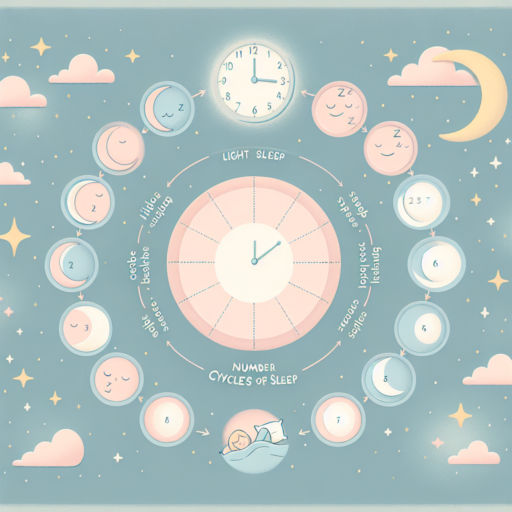Understanding Sleep: What Are Sleep Cycles?
Sleep is a complex but crucial part of our everyday lives, impacting everything from our mood to our overall health. At the heart of this complexity are sleep cycles, the repeated patterns of brain activity that occur during sleep. Each cycle consists of different stages, including both rapid eye movement (REM) and non-REM sleep, which play distinct roles in our rest and recovery processes.
At the beginning of the night, we experience a higher proportion of non-REM sleep, which gradually gives way to more REM sleep as the night progresses. This shift is significant because non-REM sleep is known for its restorative properties, allowing for physical recovery and growth, whereas REM sleep is when most of our dreaming occurs, playing a key role in memory consolidation and emotional regulation.
The Stages of a Sleep Cycle
- Stage 1: This is the lightest stage of sleep, often considered the transition phase between wakefulness and sleep.
- Stage 2: During this stage, the body begins to relax more deeply, with slower brain waves, preparing for deeper sleep.
- Stage 3: Often referred to as deep sleep or slow-wave sleep, this stage is crucial for physical recovery and immune system strengthening.
- REM Sleep: This phase is characterized by rapid eye movement, increased brain activity, and vivid dreams. It’s essential for cognitive functions like learning and memory.
Understanding the importance and function of these cycles can transform our approach to sleep hygiene and overall well-being. By aligning our habits and routines with the natural rhythms of our sleep cycles, we can enhance our ability to fall asleep faster, enjoy more restorative sleep, and wake up feeling refreshed and ready to tackle the day.
How Many Cycles of Sleep Do You Need Per Night?
Understanding the number of sleep cycles one needs each night is crucial for optimal health and well-being. A sleep cycle refers to the progression through various stages of non-REM and REM sleep. Each of these cycles lasts about 90 minutes and is repeated several times throughout the night.
The Ideal Number of Sleep Cycles
Experts typically recommend that adults aim for about 4 to 6 cycles of sleep each night. This equates to approximately 6 to 9 hours of sleep. The variation in recommended cycles accounts for individual differences in sleep needs and the quality of sleep one achieves. It’s crucial to listen to your body and adjust your sleep schedule accordingly to ensure you’re getting enough restorative sleep.
It’s important to note that missing sleep cycles or experiencing fragmented sleep can significantly impact your health. Disrupted sleep patterns can lead to impaired cognitive function, mood disturbances, and increased stress levels. Maintaining a consistent sleep schedule and creating a bedtime routine can help optimize your sleep cycles, leading to improved overall health and well-being.
Incorporating healthy sleep habits, such as limiting exposure to blue light before bedtime and ensuring a comfortable sleeping environment, can also play a pivotal role in achieving the optimal number of sleep cycles. Paying attention to these details can help maximize the benefits of each sleep cycle, enhancing your ability to function and thrive during your waking hours.
The Importance of Completing Multiple Sleep Cycles
Understanding the impact of completing multiple sleep cycles is crucial for enhancing overall health and well-being. A sleep cycle, typically lasting about 90 minutes, involves different stages of sleep, each serving a unique purpose in restoring the body and mind. People often underestimate the significance of progressing through these cycles multiple times each night. This oversight can lead to various health issues, affecting both mental and physical health.
Achieving enough sleep cycles ensures that the body gets adequate deep sleep and REM sleep. Deep sleep is vital for physical recovery, including tissue repair and growth hormone release, while REM sleep plays a significant role in memory consolidation and emotional regulation. Lack of sufficient cycles can disrupt these critical processes, leading to diminished cognitive performance and increased stress levels.
Furthermore, the continuity of complete sleep cycles directly correlates with one’s ability to maintain concentration, make decisions, and manage emotions effectively. It’s not just the quantity of sleep that matters but the quality and completeness of the cycles. Waking up in the middle of a sleep cycle can leave an individual feeling groggy and less functional. Hence, aiming for an optimal number of sleep cycles—usually five to six per night—is ideal for reaping the benefits of sleep fully.
Breaking Down the Sleep Cycle: Stages of Sleep Explained
Understanding the multifaceted world of sleep involves delving into the stages that compose the sleep cycle. Every night, as we close our eyes and drift off, our bodies embark on an intricate journey through these different phases, each critical for restoring and rejuvenating both mind and body.
The Four Main Stages of Sleep
The sleep cycle is broken down into four main stages: three falling under non-REM (Rapid Eye Movement) sleep, and the final one being the well-known REM sleep. Initially, you start with the lightest stage of sleep, gradually moving into deeper, more restorative stages.
1. Stage 1 (N1): This is the lightest stage of sleep, often described as the transition phase between wakefulness and sleep. It’s a short period where the body begins to slow down its functions.
2. Stage 2 (N2): Here, the body enters a more subdued state with decreased heart rate and body temperature. This stage serves as a preparation for deep sleep.
3. Stage 3 (N3): Often referred to as deep or slow-wave sleep, this stage is crucial for physical restoration, immune system boosting, and growth hormone release.
4. REM Sleep: The final stage, characterized by rapid eye movement, is where most dreaming occurs. REM sleep plays an essential role in emotional regulation, memory consolidation, and brain development.
Each of these stages plays a vital role in ensuring that our sleep is restful and restorative. As we transition from one stage to the next, our bodies and minds undergo numerous processes that are crucial for our overall health and well-being.
How To Calculate Your Ideal Number of Sleep Cycles
Understanding the intricacies of sleep can significantly improve your overall health and lifestyle balance. An essential aspect to delve into is the calculation of your ideal number of sleep cycles. Sleep cycles last approximately 90 minutes each, encompassing different stages from light sleep to deep REM (Rapid Eye Movement) sleep. By tailoring your sleep schedule around these cycles, you can wake up feeling more refreshed and energized.
To calculate your ideal number of sleep cycles, you firstly need to determine how many hours of sleep you optimally require. Although the average adult benefits from 7-9 hours, this can vary based on personal health, lifestyle, and genetic factors. Once you have your ideal sleep duration, divide this number by 1.5 (the average length of a sleep cycle) to find out the number of cycles that best suits you. For instance, if your optimal sleep time is 7.5 hours, dividing this by 1.5 will result in 5 complete sleep cycles.
Adjusting your sleep pattern involves some degree of trial and error. Begin by setting a consistent bedtime that allows for your ideal number of sleep cycles before your standard wake-up time. If you find yourself feeling groggy upon waking, consider adjusting your sleep timing in 15-minute increments to fine-tune the alignment with your natural sleep cycles. It’s also beneficial to incorporate a wind-down routine before bed to signal your body it’s time to sleep, enhancing the quality of your rest.
Evidence-Based Benefits of Completing 4-6 Sleep Cycles a Night
Certainly, understanding the profound influence of sleep on our overall health is crucial. The concept of completing 4-6 sleep cycles per night, a cycle typically lasting about 90 minutes, has been heavily studied for its broad range of benefits. Here, we explore evidence-based advantages of adhering to this sleep pattern.
One of the primary benefits of completing 4-6 sleep cycles includes enhanced cognitive performance. During deep sleep phases, our brains engage in crucial processes like memory consolidation and problem-solving. Studies have shown that individuals who achieve a sufficient number of complete sleep cycles exhibit improved attention, higher cognitive function, and enhanced creativity compared to those who don’t. This restorative sleep phase is essential for learning new information and for the overall health of the brain.
Another significant benefit relates to emotional and psychological well-being. Adequate sleep has been closely linked with reduced stress levels and lower incidences of mood disorders. During the REM stage of a sleep cycle, our brains process emotional experiences and can help in regulating emotions. Consequently, consistently completing 4-6 sleep cycles can contribute to better emotional resilience and more balanced mental health.
Physical health also reaps substantial rewards from proper sleep patterns. Sleep is critical for the body’s repair processes; it bolsters the immune system, regulates hormones, and aids in recovery from physical activity. Notably, individuals sticking to 4-6 cycles a night often report improved metabolic rates and a reduced risk of chronic diseases, including heart disease and type 2 diabetes. This evidence underscores the indispensable role of sleep in maintaining our physical wellbeing.
Incorporating the right amount of complete sleep cycles into your nightly routine could, as research suggests, be transformative to your health and daily functioning.
How Your Sleep Cycle Needs Change With Age
As we age, our bodies experience many changes, including alterations in our sleep patterns and requirements. Understanding these changes is crucial for maintaining optimal health and well-being.
The Evolution of Sleep Needs Over Time
During our younger years, our bodies demand longer sleep durations to support growth and development. Adolescents, for instance, might require about 8 to 10 hours of sleep each night. However, as we transition into adulthood, this need decreases slightly, with the recommended range falling to 7-9 hours. Entering middle age and beyond, many people find their sleep becomes more fragmented. Although the total sleep requirement may not decrease significantly, the pattern in which we achieve this rest alters dramatically.
Factors Influencing Sleep Cycle Changes
Several factors contribute to these shifts in sleep needs. One major factor is the change in the production of certain hormones, such as melatonin, which plays a critical role in our sleep-wake cycle. As we age, our bodies produce melatonin in smaller amounts, making it more challenging to fall asleep and stay asleep. Environmental and lifestyle factors, such as stress levels and physical health, also play a substantial role in determining the quality and quantity of sleep we are able to achieve. Additionally, the prevalence of sleep disorders, including sleep apnea and insomnia, increases with age, further complicating the ability to get a restorative night’s sleep.
Adapting to these changes requires awareness and often, adjustments in our sleep hygiene practices. Simple strategies, such as maintaining a consistent sleep schedule, limiting exposure to screens before bedtime, and ensuring a comfortable sleep environment, can significantly improve sleep quality, regardless of age. Embracing the evolving needs of our bodies helps us to maintain vitality and health throughout our lives.
Common Factors That Disrupt Sleep Cycles and How to Mitigate Them
Sleep plays a pivotal role in maintaining our overall health, yet many individuals find their sleep cycles disrupted by various factors. Understanding these disruptions can aid in finding solutions to enhance sleep quality.
Caffeine and Alcohol Intake
Consuming caffeine and alcohol even several hours before bedtime can significantly disrupt your sleep cycle. These substances affect the quality of REM sleep, leading to a restless night. To mitigate this, consider limiting caffeine consumption to the early hours of the day and reducing alcohol intake, especially close to bedtime.
Blue Light Exposure
In today’s digital age, exposure to blue light from screens is a common disruptor of sleep cycles. This type of light hinders the production of melatonin, a hormone that signals your body it’s time to sleep. Implementing a digital curfew an hour before bedtime or using blue light filters on devices can help counteract its effects.
Stress and Anxiety
Stress and anxiety are also significant contributors to disrupted sleep cycles. The state of being constantly on edge or anxious can make it difficult to fall asleep or stay asleep. Developing a relaxing pre-bedtime routine, including activities such as reading or meditating, can help prepare your mind for rest, reducing the likelihood of sleep disruptions.
Tools and Tips to Track and Improve Your Sleep Cycles
Improving the quality of your sleep is crucial for maintaining your overall health and well-being. One effective strategy to enhance your sleep patterns is by utilizing a variety of tools and adopting specific tips that help monitor and adjust your sleep cycles for the better. By understanding and applying these methods, you can significantly improve the quality of your rest and, consequently, your ability to function optimally during the day.
Adopt a Smart Alarm Clock
Smart alarm clocks are designed to wake you up at the optimal time of your sleep cycle, ensuring that you feel refreshed rather than groggy. These devices analyze your sleep stages and wake you up during a light sleep phase, which is the natural point of transition to wakefulness. By waking up during this phase, it is easier for you to start your day on a positive note. Additionally, many smart alarm clocks come with features that help you fall asleep, such as emitting soothing sounds or simulating a sunset.
Use Sleep Tracking Apps
Sleep tracking apps have become increasingly popular for those looking to gain insights into their sleeping patterns. These apps track the duration and quality of your sleep, provide analyses of your sleep cycles, and offer personalized tips to improve your sleep quality. By understanding your sleep patterns, you can make informed adjustments to your lifestyle, like modifying your diet or exercise routine, to foster better sleep.
Establish a Consistent Sleep Schedule
Maintaining a consistent sleep schedule is one of the simplest yet most effective strategies for enhancing your sleep quality. Going to bed and waking up at the same time every day, including weekends, helps regulate your body’s internal clock. This consistency reinforces your body’s sleep-wake cycle, making it easier to fall asleep and wake up naturally. Over time, this habit can significantly improve your sleep quality and increase your daytime alertness.
By integrating these tools and tips into your daily routine, you can create a conducive environment for healthy sleep cycles. Tracking and improving your sleep not only enhances your physical health but also elevates your mental and emotional well-being.Sure, focusing solely on the topic provided, here’s a structured approach to the content needed:
No se han encontrado productos.
Frequently Asked Questions About Sleep Cycles
Understanding sleep cycles is critical for improving your overall health and well-being. Many questions arise when we dive into the complexities of how sleep works. Let’s explore some of the most commonly asked questions to shed light on this crucial aspect of our lives.
What Are the Different Stages of a Sleep Cycle?
Experts divide sleep into several stages, including light sleep, deep sleep, and REM (Rapid Eye Movement) sleep. Each plays a significant role in our body’s process of restoration and healing. Deep sleep is crucial for physical recovery, whereas REM sleep supports cognitive functions like memory and learning.
How Long Is a Typical Sleep Cycle?
A typical sleep cycle lasts about 90 to 110 minutes, repeating several times throughout the night. Understanding this can help you tailor your sleeping habits to wake up feeling more refreshed by timing your sleep to coincide with the end of a sleep cycle.
Why Is It Important to Complete Multiple Sleep Cycles?
Completing multiple sleep cycles is vital for both mental and physical health. It ensures that the body gets enough deep and REM sleep, which are essential for various bodily functions, healing, and brain activities. A night of uninterrupted sleep incorporates several cycles, contributing to optimal health outcomes.



